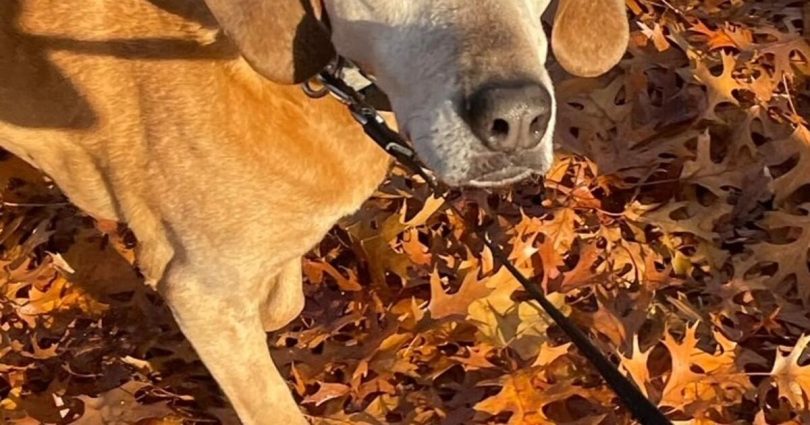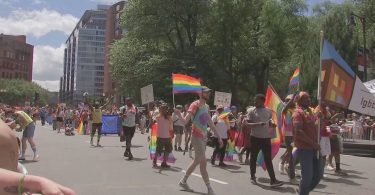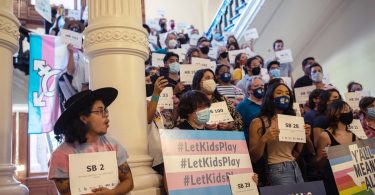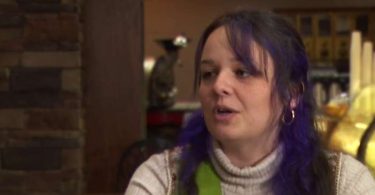Quaker, our golden Rhodesian Ridgeback, was nearly 12 years old when we adopted him to be a companion for my husband, who had been feeling lonely after working from home for three years and struggling to make friends in Dallas post-pandemic. Quaker’s affectionate nature was a perfect counterbalance to Barnabas, our grumpy 14-year-old Lancashire Heeler, whom we brought home just two months later.
We chose to adopt senior dogs because they’re often passed over and don’t deserve to be left behind just because they’re older. Having experienced rejection ourselves, we understand how important it is to give them the love and care they deserve.
Quaker’s adoption papers described him as dainty and gentle, a description he lived up to perfectly. Quaker naively believed that every snarling dog just wanted to be his friend, so he’d whine and wag his tail, hoping they’d come around—and naturally, every family member and friend who visited instantly fell in love with him. Quiet and clumsy, Quaker was my husband’s shadow, following him from room to room, often knocking things over in the most unintentionally hilarious ways—and then scaring himself in the cutest way whenever something toppled.
Never Miss a Beat
Subscribe to our newsletter to stay ahead of the latest LGBTQ+ political news and insights.
Although we knew rescuing a senior dog meant facing their limited time, Quaker’s passing still came as a shock. This loss underscored how deeply pets become woven into our lives, offering profound and unexpected sources of joy and comfort.
Fall is my favorite time of year, and sharing it with Quaker was a joy. We took him on walks through the leaves, visited pumpkin patches, and tried to dress him in cozy sweaters. Despite his reluctance to wear costumes—he only tolerated a human-sized sweater once—Spirit Halloween’s pet costume section and Dallas’s Halloween parade, with its Best Pet Costume contest, let pets join in on the fun. Our dog-friendly, gay neighborhood made Halloween extra special by giving out treats to pets in costume. Dressing up was about creating happy moments with our pets, not just making them look cute. Even though Quaker and Barnabas wouldn’t wear matching flannel sweaters for winter photos, these moments became treasured memories.
For Quaker’s adoption anniversary, which we celebrated as his “birthday,” we threw a small party with juicy burgers and sang “Happy Birthday” to him. Quaker was so thrilled by the burgers that he trembled with excitement. We laughed together as a family, grateful to celebrate the day that marked our start as a “pack.” Seeing him enjoy his special treat and his happy, wagging tail was a joyful reminder of our bond. Now, looking back, those moments are bittersweet, especially with Quaker’s recent passing, which has left a significant void in our lives.
Queer people often face rejection from their families of origin, and for many who are child-free, pets become beloved members of their chosen families. This bond is reflected in how we include them in our daily lives, like taking them to dog-friendly cafés and restaurants. I’ll never forget the first time we took Quaker to a café. He sat in a chair with a plate of bacon and eggs, eagerly ate it, then threw it up and cheerfully ate it again before we could stop him. Moments like this show how we embrace our pets as part of the family, deserving of the same experiences we enjoy.
This sentiment also appears in queer weddings, where pets often serve as flower girls, ring bearers, or even best men, decked out in bow ties or floral collars. I once attended a wedding that was entirely dog-friendly, with a special food spread just for canine guests. Whether sharing a Puppuccino, attending Pride events in rainbow gear, or being part of wedding ceremonies, pets hold a special place in our lives, celebrated as true family members.
The morning of Quaker’s passing was a whirlwind. We knew he had serious heart troubles, but nothing prepared us for what happened. I woke up to my husband’s frantic calls to come to the living room, where Quaker lay conscious but unmoving, his heart racing uncontrollably. I comforted him on the floor and called an Uber to rush us to the emergency vet. My husband carried him downstairs, and although Quaker seemed surprisingly calm, I could see he was struggling to breathe, with his enlarged heart visibly pounding beneath his fur.
At the vet, we learned that his heart was the size of a softball, had a tumor, and his lungs were filled with fluid. Faced with the choice of letting him suffer or choosing euthanasia, we decided to end his suffering. We surrounded Quaker with love, holding and kissing him as the doctor administered the medication, and I thanked him for his presence in our lives, promising that I’d look for him in our next lifetimes as he peacefully trekked off to the Rainbow Bridge. Leaving his body behind was painful, and though I knew he was no longer on this plane of existence, I felt a profound sense that we were abandoning him. It was a heart-wrenching experience.
Before we left the vet’s office, we had to decide what would happen to Quaker’s remains, a decision I hadn’t anticipated. We were given the option between public and private cremation, and thankfully, we could afford private cremation to ensure his remains would be handled with care. We also had the choice between a metal urn or an elegant pine box. Inspired by a friend who kept his Great Danes’ remains in beautiful wooden boxes, we chose the pine box for Quaker.
The $500 cost for the cremation and box made me reflect on our privilege to give him a dignified farewell.
Although we didn’t hold a ceremony, picking up his ashes a week later left me overwhelmed with the grief of his absence, yet comforted by knowing his remains were housed in such a thoughtful vessel.
It’s been a real emotional rollercoaster without Quaker. I miss the sound of his little feet tapping when he was about to get a cookie, his excitement before a walk, and how he’d stop to sniff every flower. The special bond he had with my husband is something I deeply miss, along with the joy on my husband’s face when Quaker gave him kisses. We’re finding our way with just me, my husband, and Barnabas, who now cuddles between us and sleeps with us each night.
Quaker’s ashes in the pine box serve as a reminder of his absence, but his spirit feels very much with us. We’ve placed his ashes next to photos of our grandmothers, and we think of him with the same reverence as our ancestors. We miss him as the “person” he was to us, not just as a pet.
Creating a ritual for him, similar to how we celebrated birthdays and holidays together, helps us find closure. Now, as part of our nightly routine, I say, “I love you, I love Barnabas, and my Heaven dog Quaker.”
Losing a pet can be as tough as losing a loved one because the love we have for them is just as profound. To keep their memory alive, make them a central part of your life every day. Spend quality time together, take them on walks in their favorite park, and give them a few extra treats now and then. You might even plan a special dinner date just for the two of you. Capture their presence in photos, include them in the yearly Hanukkah card, or take them on a trip to Bali. You could let them carry the flowers at your wedding or give them your grandfather’s middle name.
Go overboard in your love for them. Pets leave paw prints on our hearts, and honoring them every day helps us hold onto their memory and the joy they brought into our lives.
Don’t forget to share:







